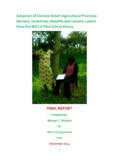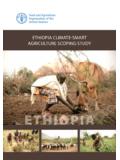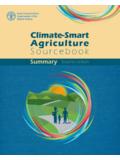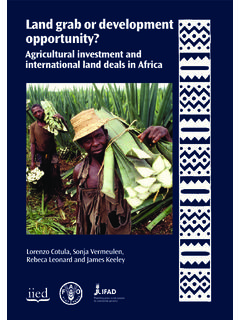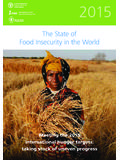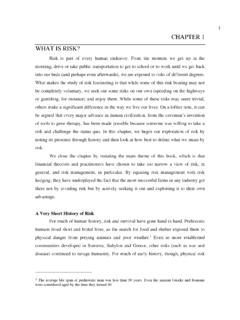Transcription of ENTREPRENEURSHIP in farming - Food and Agriculture ...
1 FOOD AND Agriculture ORGANIZATION OF THE UNITED NATIONSRome 20125 Farm management extension guideENTREPRENEURSHIPin farmingbyDavid KahanThe designations employed and the presentation of material in this information product do not imply the expression of any opinion whatsoever on the part of the Food and Agriculture Organization of the United Nations (FAO) concerning the legal or development status of any country, territory, city or area or of its authorities, or concerning the delimitation of its frontiers or boundaries. The mention of specific companies or products of manufacturers, whether or not these have been patented, does not imply that these have been endorsed or recommended by FAO in preference to others of a similar nature that are not mentioned. The views expressed in this information product are those of the author(s) and do not necessarily reflect the views or policies of 978-92-5-107547-0 (print) E-ISBN 978-92-5-107548-7 (PDF) FAO 2013 FAO encourages the use, reproduction and dissemination of material in this information product.
2 Except where otherwise indicated, material may be copied, downloaded and printed for private study, research and teaching purposes, or for use in non-commercial products or services, provided that appropriate acknowledgement of FAO as the source and copyright holder is given and that FAO s endorsement of users views, products or services is not implied in any requests for translation and adaptation rights, and for resale and other commercial use rights should be made via or addressed to information products are available on the FAO website ( ) and can be purchased through lot is being said these days about farmers becoming entrepreneurs . But what is ENTREPRENEURSHIP ? What does it take to be entrepreneurial? How can an entrepreneurial behaviour be created and sustained? How can entrepreneurial skills be developed? How do entrepreneurial farmers respond to the changing farming environment?
3 What strategies do they use? What actions do they take? And how can extension workers help farmers develop entrepreneurial capacity? There are two parts to ENTREPRENEURSHIP . The first is the managerial skills needed to start and run a profitable farm business. The second is entrepreneurial spirit . Both are important. Managerial skills can be taught, but an entrepreneurial spirit cannot be taught. Many farmers are already excellent managers and many also have some of the spirit of an entrepreneur. As price takers many farmers have developed outstanding abilities to make the most of their resources. But being price takers suggests that these farmers are not innovative, do not take risks, and lack the drive that is usually associated with an entrepreneurial spirit. The purpose of this guide is to provide a better understanding of the concept and practice of ENTREPRENEURSHIP .
4 With this understanding it is hoped that extension workers will be better able to help farmers develop the skills and spirit of an entrepreneur. It is part of a series of booklets on farm business management designed to help extension workers support farmers. iv What is presented in this guide can be applied to people who want to start a farm business for the first time and to farmers who are already running a farm business. In every country, both situations occur. Many existing farmers want to make changes to their farming systems by introducing high value enterprises directed to the market. There are also many newcomers (young and old, male and female) entering farming who are starting with their first farming enterprise. This guide can help extension workers help all of these potential farmer-entrepreneurs. While field level extension workers will rarely be responsible for designing and organizing trainings in ENTREPRENEURSHIP development, it is useful for them to understand what works and what doesn t.
5 Sometimes they may be work closely with Subject Matter Specialists who have experience in management training or even in facilitating external trainers. vContentsPreface ..iiiAcknowledgements ..viChapter 1 UNDERSTaNDINg ENTREPRENEURSHIP IN farming .. 1 Chapter 2 ENTREPRENEURIal RESPoNSES .. 25 Chapter 3 ENTREPRENEURIal qUalITIES .. 47 Chapter 4 BUIlDINg ENTREPRENEURSHIP SKIllS .. 71 Chapter 5 ExTENSIoN SUPPoRT foR DEvEloPINg ENTREPRENEURIal CaPaCITy .. 93 Further Reading .. 123vi acknowledgementsThe author would like to acknowledge the assistance of colleagues and friends. Thanks are due to Steve Worth and Martin Hilmi for their review of the guide, Joanne Morgante and Ana Pizarro, who managed the post-production process and the design and final layout of the KahanChapter 1 Understanding ENTREPRENEURSHIP in farmingWhat is ENTREPRENEURSHIP ?
6 ENTREPRENEURSHIP is a key factor for the survival of small-scale farming in an ever-changing and increasingly complex global economy. But what is ENTREPRENEURSHIP in Agriculture ? How does it relate to small-scale farmers who operate on the edges of the economy?Farmers as entrepreneursFarmer-entrepreneurs see their farms as a business. They see their farms as a means of earning profits. They are passionate about their farm business and are willing to take calculated risks to make their farms profitable and their businesses grow. The entrepreneurial environmentFarmer-entrepreneurs operate in a complex and dynamic environment. They are part of a larger collection of people including other farmers, suppliers, traders, transporters, processors and many others. Each of these has a role to play in producing products and moving them through to the market through the value chain.
7 Each one needs to be an entrepreneur. They also need to respect each other and work together to make the whole system work better and be more dynamicsBut beyond this, successful farmer-entrepreneurs are technically competent, innovative and plan ahead so they can steer their farm businesses through the stages of enterprise development from establishment and survival to rapid growth and maturity. However, there are many challenges that these farmers face: social barriers, economic barriers, regulations, access to finance and information, and their own managerial capacity to cope with risks and changes and to seize PoINTS IN CHaPTER 12 ENTREPRENEURSHIP in farmingFor small-scale farmers to become more entrepreneurial assistance from extension workers and supporting institutions is neededUnderstanding ENTREPRENEURSHIP in farming 3 WHaT IS ENTREPRENEURSHIP ?
8 ENTREPRENEURSHIP , value chains and market linkages are terms that are being used more and more when talking about Agriculture and farming . Many small-scale farmers and extension organisations understand that there is little future for farmers unless they become more entrepreneurial in the way they run their farms. They must increasingly produce for markets and for profits. Becoming more entrepreneurial can be a challenge for small-scale farmers. They will need help from extension workers and other institutions. What is an entrepreneur? An entrepreneur is someone who produces for the market. An entrepreneur is a determined and creative leader, always looking for opportunities to improve and expand his business. An entrepreneur likes to take calculated risks, and assumes responsibility for both profits and losses. An entrepreneur is passionate about growing his business and is constantly looking for new opportunities.
9 Entrepreneurs are also innovators. They always look for better and more efficient and profitable ways to do things. Being innovative is an important quality for a farmer-entrepreneur, especially when the business faces strong competition or operates in a rapidly changing environment* * *4 ENTREPRENEURSHIP in farmingfaRmERS aS ENTREPRENEURSCan small-scale farmers become entrepreneurs? Yes. Small-scale farmers all over the world have shown a remarkable ability to adapt. They look for better ways to organise their farms. They try new crops and cultivars, better animals, and alternative technologies to increase productivity, diversify production, reduce risk and to increase profits. They have become more market-oriented and have learned to take calculated risks to open or create new markets for their products.
10 Many small-scale farmers have many of the qualities of an entrepreneur. For small-scale farmers to become entrepreneurs they need all of these qualities and more. They need to be innovative and forward-looking. They need to manage their businesses as long-term ventures with a view to making them sustainable. They need to be able to identify opportunities and seize them. Some small-scale farmers do have these qualities, but they still focus on maintaining their traditional way of life. Their production decisions are based on what they need -- not on what is possible. The farmer-entrepreneur produces a clear picture in his mind of what is possible and the future he wants. He knows that what is possible is determined by the market. The farmer-entrepreneur is always looking for new opportunities. He knows that new opportunities are found in the market. The farmer-entrepreneur wants to make profits.


